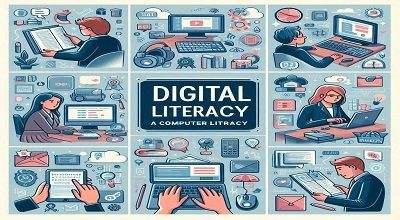Digital Literacy
Digital Literacy refers to the ability to use, understand, and navigate digital technologies and information effectively. It encompasses a range of skills and knowledge that enable individuals to interact with digital devices, platforms, and content in a meaningful and informed way. Here are some examples of digital literacy skills and concepts:
- Basic Computer Skills: Understanding how to use a computer, including turning it on and off, using a mouse and keyboard, managing files and folders, and installing software.
- Internet Navigation: Knowing how to browse the internet, use search engines (e.g., Google), and navigate websites. Understanding concepts like URLs and hyperlinks.
- Email Communication: Being able to send and receive emails, attach files, and use email features like folders and filters.
- Social Media Literacy: Understanding how to use social media platforms like Facebook, Twitter, or Instagram, and being aware of privacy settings and online etiquette.
- Online Safety and Security: Knowing how to protect personal information online, recognizing phishing attempts, and using strong, unique passwords.
- Media Literacy: The ability to critically evaluate information and media sources for credibility and bias. This includes recognizing fake news and understanding how images and videos can be manipulated.
- Digital Content Creation: Skills related to creating digital content, such as writing blog posts, creating videos, or designing graphics. Familiarity with tools like Microsoft Office, Adobe Creative Suite, or video editing software.
Read More…
- Coding and Programming: Basic understanding of coding languages like HTML, CSS, or JavaScript, and the ability to write simple code or scripts.
- Data Literacy: Understanding how to interpret and use data, including concepts like data analysis, visualization, and data privacy.
- Online Research: Knowing how to effectively search for information online, evaluate the quality of sources, and cite them properly.
- E-commerce Skills: Ability to shop online securely, understand online payment methods, and navigate e-commerce platforms.
- Digital Citizenship: Understanding the ethical and legal aspects of the digital world, including issues related to copyright, cyberbullying, and digital rights.
- Adaptive Learning: The ability to quickly learn and adapt to new digital tools and technologies as they emerge.
- Virtual Collaboration: Proficiency in using tools like video conferencing, messaging apps, and project management software for remote collaboration.
- Augmented and Virtual Reality (AR/VR): Understanding how to use AR/VR technologies for various purposes, such as education, entertainment, or training.
Note:
These are just some examples of Digital Literacy skills and concepts. Digital literacy is a dynamic and evolving field as technology continues to advance, so staying updated and continually learning new skills is essential in the digital age.
